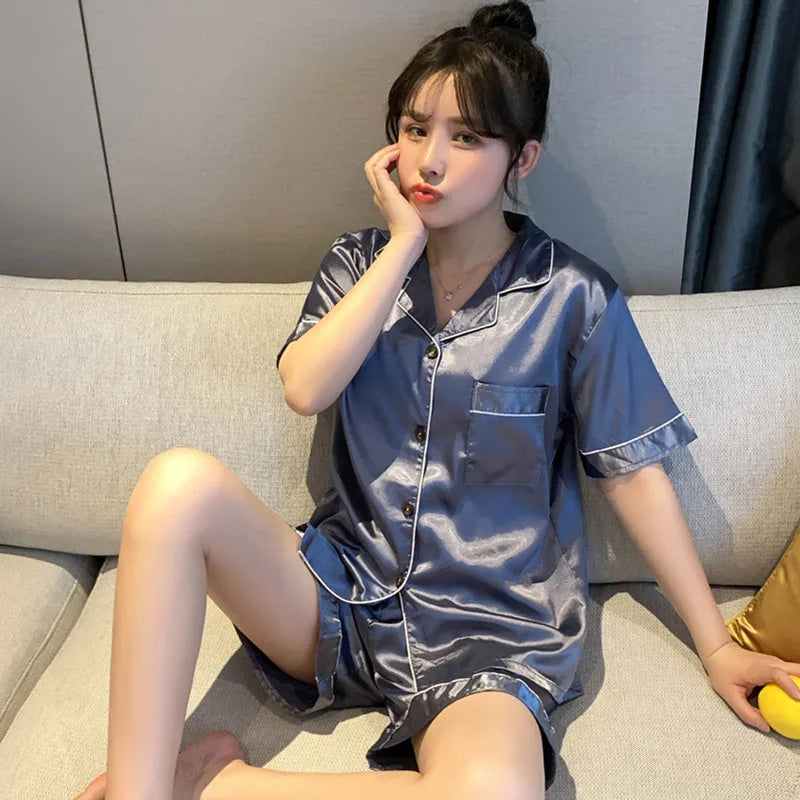What Fabric to Use for Pajamas: Choosing Comfort and Style
Table of Contents
Introduction
Have you ever found yourself tossing and turning at night, unable to get comfortable in your pajamas? You’re not alone. The fabric of our sleepwear plays a crucial role in determining how well we sleep, and the right choice can truly transform our nightly experience. Did you know that the wrong fabric can lead to overheating, skin irritation, or discomfort that disrupts your rest? Choosing the right fabric for pajamas is essential for achieving that perfect blend of comfort and style.
At Relaxed Nights, we understand that every woman deserves to feel beautiful and comfortable, especially when she’s winding down for the day. Our journey began with a simple vision: to elevate the way women experience their evenings, nights, and mornings. We believe that the right nightwear should not only feel good but also reflect elegance and grace.
In this blog post, we will explore various fabrics commonly used for pajamas, including their benefits and drawbacks. We will delve into cotton, moisture-wicking fabrics, silk, bamboo, and more, enabling you to make an informed decision when selecting your next pair of pajamas. By the end of this post, you’ll have a clearer idea of what fabric to use for your pajamas that caters to your personal comfort preferences and lifestyle.
Let’s embark on this journey together as we uncover the best fabrics for pajamas, ensuring you greet each day with renewed energy and style.
Understanding Pajama Fabrics
Choosing the right fabric for pajamas involves understanding how different materials react to our bodies and the environment. Each fabric brings unique properties that can affect your comfort, temperature regulation, and overall sleep quality. Here, we will discuss several key fabrics you can consider for your nightwear.
Cotton: The Classic Choice
Cotton is perhaps the most popular fabric choice for pajamas, and for good reason. It is a natural fiber, known for its breathability, softness, and durability. Cotton pajamas can be found in various weaves and weights, making them suitable for year-round use.
Benefits of Cotton
- Breathability: Cotton allows air to circulate freely, preventing overheating during the night.
- Softness: The natural fibers provide a gentle touch against the skin, making it comfortable to wear.
- Durability: Cotton is a resilient fabric that can withstand multiple washes, retaining its shape and comfort over time.
- Versatility: Available in various styles and weights, from lightweight cotton voile for summer to cozy flannel for winter.
Drawbacks of Cotton
- Moisture Absorption: While cotton is breathable, it tends to absorb moisture rather than wick it away, which can be uncomfortable for those who sweat during the night.
- Wrinkling: Cotton fabrics tend to wrinkle easily, which may require ironing for a polished look.
- Shrinkage: Cotton pajamas may shrink after washing, so it’s advisable to choose slightly larger sizes or pre-washed options.
Who Should Choose Cotton?
Cotton pajamas are ideal for those who prefer a classic, comfortable option that works well in various climates. They are particularly suitable for individuals with sensitive skin, as they are less likely to cause irritation.
At Relaxed Nights, we offer an exquisite Night Gowns Collection made from high-quality cotton, ensuring you can enjoy both comfort and elegance. Explore our collection here.
Moisture-Wicking Fabrics: For Active Sleepers
Moisture-wicking fabrics have gained popularity in recent years, especially for those who tend to sleep hot or sweat during the night. These fabrics are designed to pull moisture away from the skin, keeping you dry and comfortable.
Benefits of Moisture-Wicking Fabrics
- Temperature Regulation: These fabrics help maintain a comfortable body temperature by rapidly evaporating moisture.
- Odor Control: Many moisture-wicking fabrics are treated to resist odors, making them ideal for active wearers.
- Lightweight and Stretchy: Typically made from synthetic materials like polyester or blends, these fabrics are often lightweight and provide a snug fit.
Drawbacks of Moisture-Wicking Fabrics
- Synthetic Feel: Some moisture-wicking fabrics may feel less soft and luxurious compared to natural fibers.
- Cost: High-quality moisture-wicking pajamas can be more expensive than traditional cotton options.
- Durability: While generally durable, some synthetic fabrics can lose their moisture-wicking properties over time.
Who Should Choose Moisture-Wicking Fabrics?
If you’re an active sleeper, prone to night sweats, or live in a humid climate, moisture-wicking fabrics can offer the comfort and dryness you need for a restful night.
Our Checked Collection features pajamas crafted from moisture-wicking fabrics that provide both style and functionality. Discover our options here.
Silk: Luxurious Comfort
Silk is synonymous with luxury, and it’s no surprise that silk pajamas are a popular choice for those looking to indulge in a bit of elegance. This natural fiber is known for its lightweight, soft texture and sheen.
Benefits of Silk
- Softness and Smoothness: Silk feels incredibly soft against the skin, making it a lavish choice for sleepwear.
- Temperature Regulation: Silk is both breathable and insulating, keeping you cool in summer and warm in winter.
- Hypoallergenic Properties: Silk is less likely to cause allergic reactions, making it suitable for sensitive skin.
Drawbacks of Silk
- Care Requirements: Silk often requires dry cleaning or delicate washing to maintain its quality.
- Cost: Silk pajamas can be on the pricier side due to the labor-intensive production process.
- Durability: Silk is less durable than other fabrics and may snag or tear if not handled carefully.
Who Should Choose Silk?
Silk pajamas are perfect for those who prioritize luxury and comfort in their sleepwear. If you appreciate the finer things in life and don’t mind the additional care, silk can provide an exquisite sleep experience.
At Relaxed Nights, we celebrate elegance with our Women Sets Collection, which includes stunning silk options that elevate your nightly routine. Explore our collection here.
Bamboo: Eco-Friendly and Soft
Bamboo fabric has gained traction in recent years, praised for its softness and eco-friendly properties. Made from the pulp of the bamboo plant, this fabric offers a unique alternative to traditional pajama materials.
Benefits of Bamboo
- Sustainability: Bamboo is a fast-growing, renewable resource that requires less water than cotton.
- Hypoallergenic: Naturally hypoallergenic and antibacterial, bamboo is suitable for sensitive skin.
- Moisture-Wicking: Bamboo fabric naturally wicks moisture away from the skin, keeping you dry and comfortable.
Drawbacks of Bamboo
- Chemical Processing: While bamboo itself is sustainable, the process of turning it into fabric can involve chemicals, so it’s essential to choose responsibly sourced options.
- Durability: Bamboo fabric may not be as durable as cotton and can pill or fade over time.
- Wrinkling: Similar to cotton, bamboo fabrics can wrinkle, requiring occasional ironing.
Who Should Choose Bamboo?
Bamboo pajamas are an excellent choice for eco-conscious individuals who prioritize comfort and softness. If you have sensitive skin or prefer lightweight sleepwear, bamboo can provide a cozy option.
For those who love the feel of bamboo, our Onesies Collection features stylish and comfortable options that are perfect for lounging or sleeping. Check out our collection here.
Summary of Pajama Fabrics
When selecting pajamas, it’s essential to consider not only the fabric but also your individual preferences and needs. Here’s a quick summary of the fabrics we’ve discussed:
- Cotton: Breathable, durable, and versatile; ideal for sensitive skin but can absorb moisture.
- Moisture-Wicking Fabrics: Great for active sleepers; keeps you dry but may feel less luxurious.
- Silk: Luxurious and smooth; ideal for indulging in comfort but requires delicate care.
- Bamboo: Eco-friendly and soft; suitable for sensitive skin but may lack durability.
Each fabric has its unique qualities that cater to different sleep styles and preferences. By understanding these options, you can find the perfect pajamas that align with your comfort needs.
Conclusion
Choosing the right fabric for pajamas can significantly enhance your sleep experience. Whether you lean towards the classic comfort of cotton, the luxurious feel of silk, or the eco-friendly softness of bamboo, our understanding of these materials helps us make informed choices that cater to our individual needs.
At Relaxed Nights, we are committed to providing premium night dresses that combine comfort and elegance, ensuring that every woman can embrace her nightly routine with grace. By choosing the right pajama fabric, you can transform your evenings into a serene escape, allowing you to unwind and recharge.
Now that you know what fabric to use for pajamas, we encourage you to explore our curated collections to find your perfect sleepwear. Visit us at Relaxed Nights and experience the difference that high-quality materials can make in your nightly routine.
FAQ
1. What is the best fabric for pajamas?
The best fabric for pajamas depends on personal preference and comfort needs. Cotton is a classic choice for its breathability, while silk offers a luxurious feel. Moisture-wicking fabrics are ideal for those who sweat at night, and bamboo is a great eco-friendly option.
2. Are silk pajamas worth the investment?
Yes, silk pajamas can be a worthy investment for those seeking comfort and elegance. They provide a soft, luxurious feel and are temperature-regulating, making them suitable for year-round wear.
3. How do I care for my pajamas?
Care instructions vary by fabric. Cotton pajamas can usually be machine washed, while silk requires more delicate handling, often needing dry cleaning or gentle washing. Always refer to the care label for specific instructions.
4. Can I sleep in moisture-wicking fabrics?
Absolutely! Moisture-wicking fabrics are designed to keep you dry and comfortable during the night, making them a great choice for active sleepers or those in humid climates.
5. What pajamas are best for sensitive skin?
For sensitive skin, natural fabrics like cotton and bamboo are often the best choices as they are hypoallergenic and gentle against the skin. Avoid synthetic materials that may cause irritation.
By understanding the unique qualities of these fabrics, we can all make better decisions about our sleepwear choices, ensuring a restful night and a beautiful morning.



